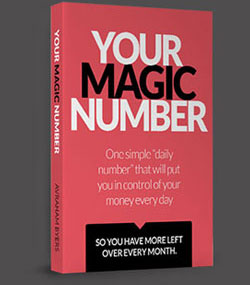A lot of us have the pre-conceived notion that the more money we make, the better off we will be. This is so engrained in us, we assume this cause and effect will be automatic and guaranteed.
In reality, this is an illusion, albeit a very powerful one, that people fall into.
Let’s look at it honestly: When we get a significant raise in our income, consciously or not, we inevitably think “now that I am making more, I can finally afford that __________ (larger home, renovation, new car, new gadget, new clothes, or long awaited vacation).” Ten years down the road, however, we look back and wonder how we are still not ahead financially. Despite receiving many raises and opportunities, we still feel like a hamster in a wheel.
Truth be told, our expenses rise with our income because we’re in the habit of spending, and we justify living beyond our means. This is not a new problem; even Charles Dickens (1812 – 1870) made note of the phenomenon in the pages of David Copperfield when he wrote: “Annual income twenty pounds, annual expenditure nineteen and six, result happiness. Annual income twenty pounds, annual expenditure twenty pounds ought and six, result misery.”
Living beyond one’s means was a problem for Charles’ generation, but it’s even more of a problem today. Charles didn’t have access to irresponsible amounts of credit like we do, and he wasn’t followed by invisible web-trackers that made note of his every behavioural nuance in order to perfect the marketing campaigns aimed in his direction. Straight up, it’s far easier for us to fall into debt today than it was when Charles was alive.
As Personal Financial Trainers, we see a lot of people, all earning income at different levels. That said, there’s one case in particular that stands out for me: Our client, in this case, was making more money in a month than most people do in a year. She moved up and advanced in her career, however, so did her expenses. She always found something to buy, and always worked out some way to justify or explain why she deserved it. After decades of being a top earner, she still had nothing saved. For some people it doesn’t matter what they make, they will spend it until it’s gone. At the same time, people can earn a lot less than we do, and still have far more to show for it at the end.
How can a Personal Financial Trainer help?
We need to know, and really internalize the idea that “a good income doesn’t always lead to a good outcome.” We also need to know that it is a lot easier to change our spending mindset with support and motivation from a professional in the field.
Making this effort to go against the grain and change our behaviours is a very rewarding endeavor. The sense of accomplishment we get when we actually change ourselves, and see financial progress as a result, is far more rewarding and satisfying than filling up on “stuff.” What’s more, the peace of mind that follows is beyond compare.
“There is no dignity quite so impressive, and no one independence quite so important, as living within your means.” –Clavin Coolidge, 50th President of the United States.



Comments are closed.